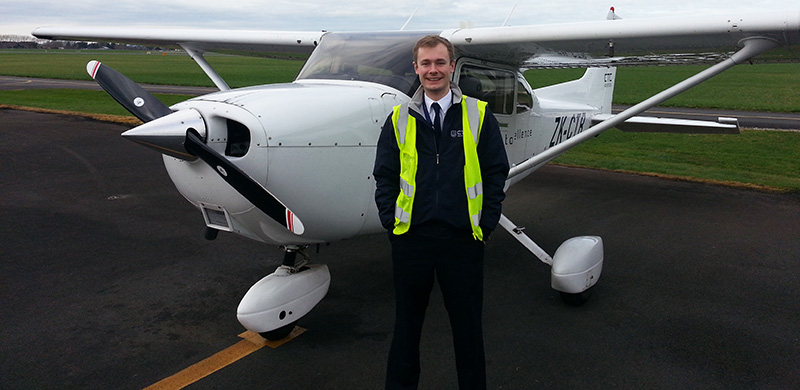
Cadet pilot Tim Muggeridge
Although I didn’t realise it at the time, it was the organ scholarship that gave me skills that were extremely transferrable to the flight deck.
I was the Parry-Wood Organ Scholar at Exeter from 2013 to 2016 whilst reading for a degree in music. Upon graduating, and to everyone’s great surprise – including my own – I decided to put my musical career on pause, and instead began applying for pilot training programmes. I am now 90% of the way through training for my Multi-Crew Pilot Licence with Virgin Atlantic.
Whilst at school I was convinced I wanted to become a professional conductor, and so I was encouraged by my Director of Music to learn the organ at age 16. Then, when it came to thinking about university, an organ scholarship at Oxford or Cambridge seemed a fantastic opportunity to continue making music whilst also engaging with the academic side of the subject. While I was choosing where to apply, Exeter really stood out, as it is the only college in either Oxford or Cambridge where a choir sings three services a week directed by the organ scholars. The absence of a Director of Music means that Exeter organ scholars are thrown in the deep end, and spend two years managing and directing one of the best mixed-voice chapel choirs in the country.
Although I didn’t realise it at the time, it was the organ scholarship that gave me skills that were extremely transferrable to the flight deck. The leadership and people skills needed to run a choir are much the same as you need in an industry where events change around you all the time. The multi-tasking involved in playing the organ – watching the conductor, making stop changes and listening to the choir – is much the same as tracking a radio beacon, listening to air traffic control, and bringing an A330 in to land. The only difference is that there is more at stake when things go wrong – but that really depends on how scary the conductor of your choir is.
